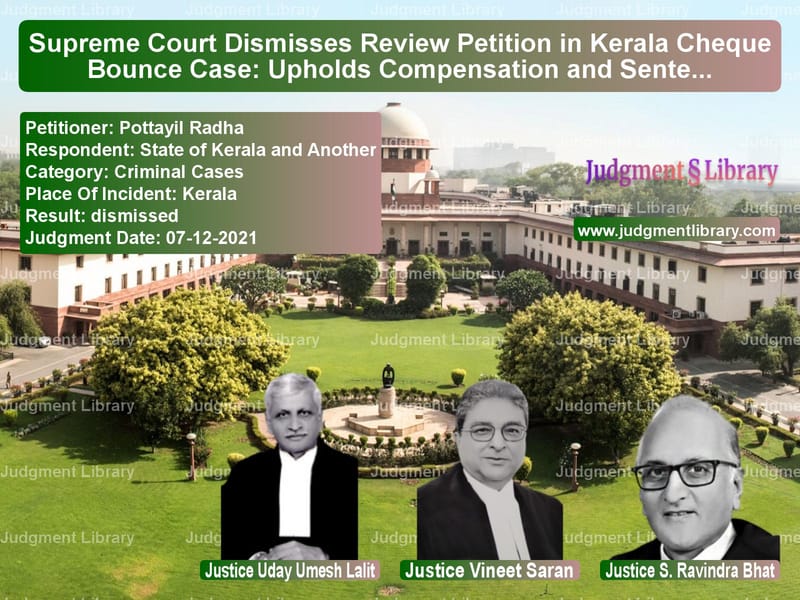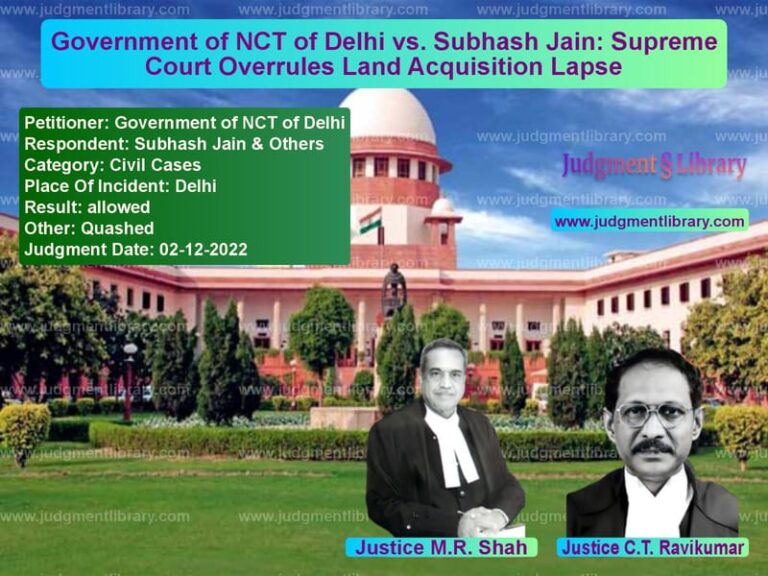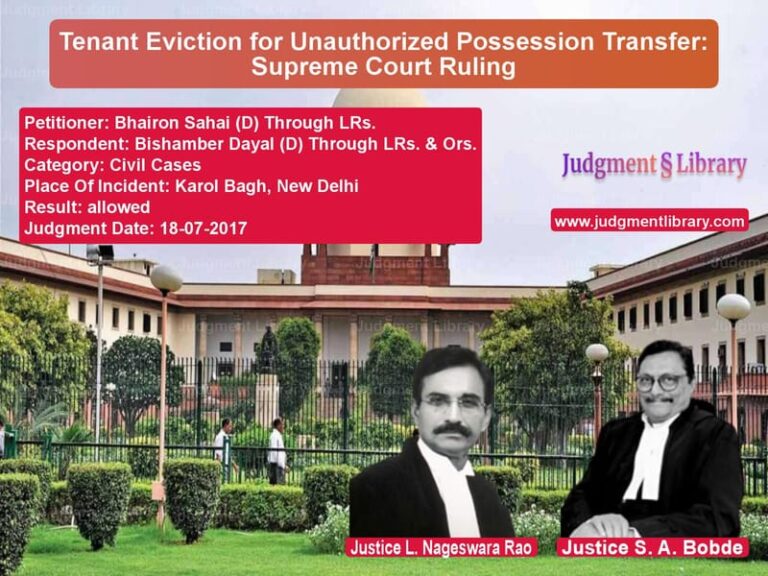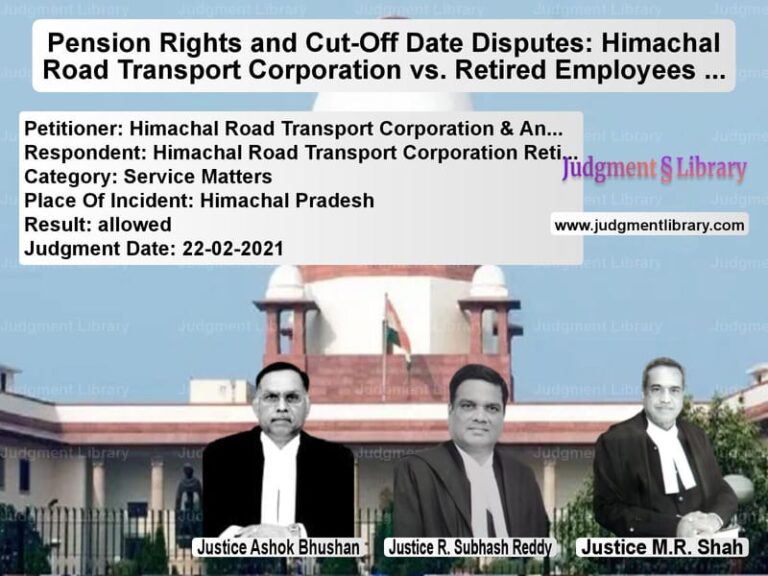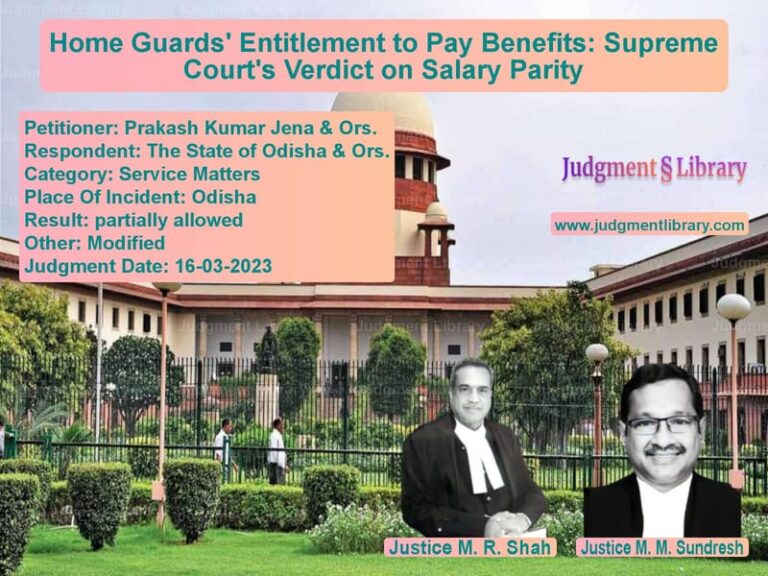Supreme Court Dismisses Review Petition in Kerala Cheque Bounce Case: Upholds Compensation and Sentence Reduction
The Supreme Court of India recently ruled in Pottayil Radha vs. State of Kerala and Another, addressing a review petition concerning a cheque bounce case under the Negotiable Instruments Act, 1881. The case centered around Section 138 of the Act, which penalizes dishonoring a cheque due to insufficient funds. The Court dismissed the review petition, affirming its earlier ruling that reduced the substantive sentence while ensuring the complainant received monetary compensation.
Background of the Case
The case originated when Pottayil Radha, the petitioner, issued a cheque that was later dishonored due to insufficient funds. The complainant, whose name was not disclosed in the petition, initiated legal proceedings under Section 138 of the Negotiable Instruments Act. The trial court convicted the petitioner, sentencing her to imprisonment along with a fine.
Upon appeal, the Kerala High Court modified the sentence, reducing the substantive imprisonment to six months but maintaining the fine. The accused subsequently approached the Supreme Court, which further reduced the imprisonment, ensuring that a significant monetary compensation was paid to the complainant. Dissatisfied with the reduction in sentence, the complainant sought a review of the Supreme Court’s decision, arguing that the leniency was unjustified.
The review petition was heard before a three-judge bench comprising Justices Uday Umesh Lalit, Vineet Saran, and S. Ravindra Bhat. The primary contention in the review petition was whether the Supreme Court had erred in reducing the substantive imprisonment while granting monetary relief.
Legal Issues Raised
- Whether the Supreme Court’s previous order contained an error apparent on the face of the record.
- Whether the reduction in substantive sentence was justified.
- Whether financial compensation sufficiently addressed the complainant’s grievance.
- Whether review jurisdiction was appropriately invoked.
Petitioner’s Arguments (Pottayil Radha)
- The petitioner contended that the Supreme Court’s reduction of the sentence was justified and in accordance with the settled principles governing Section 138 of the Negotiable Instruments Act.
- She argued that financial compensation was an adequate remedy for dishonoring a cheque and that prolonged imprisonment was excessive for an economic offense.
- The petitioner submitted that the complainant had not actively pursued the review petition, indicating a lack of genuine grievance.
Respondent’s Arguments (State of Kerala & Complainant)
- The State of Kerala defended the Supreme Court’s previous ruling, arguing that the sentence reduction was balanced with compensation.
- The complainant, despite being served notice, chose not to appear before the Court for review proceedings.
- The respondents maintained that the review petition had no merit, as the Court had already considered all aspects of the case.
Supreme Court’s Analysis
The Supreme Court analyzed the grounds raised in the review petition and found that the complainant had failed to establish any apparent error in the judgment. The Court reiterated that review jurisdiction is limited and cannot be invoked merely because one party disagrees with the verdict.
Read also: https://judgmentlibrary.com/supreme-court-grants-bail-in-uapa-case-emphasizes-right-to-speedy-trial/
Key Observations by the Supreme Court
- The reduction of the sentence was in line with the principles governing Section 138 of the Negotiable Instruments Act.
- The Court observed that compensation is an appropriate remedy in cheque dishonor cases.
- The complainant had not challenged the High Court’s reduction of the sentence at an earlier stage, weakening the basis for review.
- The Court noted that the complainant did not appear in the review proceedings despite being notified, indicating a lack of urgency or real grievance.
The Court ruled:
“The substantive sentence was reduced, but at the same time, the amount of Rs.2,50,000/- was directed to be made over to the complainant.”
Final Order
- The Supreme Court dismissed the review petition.
- The previous order reducing the substantive sentence but directing monetary compensation remained valid.
- No further appeals or modifications were permitted.
Key Takeaways
- Review petitions require an apparent error: The Court reaffirmed that review petitions cannot be used to seek a re-examination of decided cases without an apparent error.
- Compensation as a remedy: Monetary compensation was deemed a valid resolution in cases involving cheque dishonor.
- Judicial finality matters: Once a ruling is made, further challenges require compelling legal grounds.
- Economic offenses and sentencing: Courts have discretion to impose fines instead of long imprisonment in financial fraud cases.
This judgment reinforces the legal principle that review petitions must demonstrate an apparent mistake in the ruling rather than being used to seek a different outcome based on the same arguments.
Petitioner Name: Pottayil Radha.Respondent Name: State of Kerala and Another.Judgment By: Justice Uday Umesh Lalit, Justice Vineet Saran, Justice S. Ravindra Bhat.Place Of Incident: Kerala.Judgment Date: 07-12-2021.
Don’t miss out on the full details! Download the complete judgment in PDF format below and gain valuable insights instantly!
Download Judgment: pottayil-radha-vs-state-of-kerala-and-supreme-court-of-india-judgment-dated-07-12-2021.pdf
Directly Download Judgment: Directly download this Judgment
See all petitions in Cheque Dishonour Cases
See all petitions in Fraud and Forgery
See all petitions in Bail and Anticipatory Bail
See all petitions in Judgment by Uday Umesh Lalit
See all petitions in Judgment by Vineet Saran
See all petitions in Judgment by S Ravindra Bhat
See all petitions in dismissed
See all petitions in supreme court of India judgments December 2021
See all petitions in 2021 judgments
See all posts in Criminal Cases Category
See all allowed petitions in Criminal Cases Category
See all Dismissed petitions in Criminal Cases Category
See all partially allowed petitions in Criminal Cases Category

